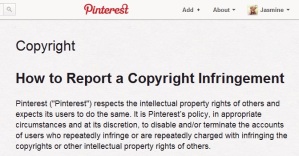 I described the concept of Pinterest to one of my more astute friends the other day, and his first reaction was, “Isn’t that copyright infringement?” It certainly sounds like there is a risk of copyright infringement if you’re grabbing pictures from webpages without bringing any associated content, but most complaints are staved off by the source links that come with the pinned image. In theory, anyone should be able to click through from Pinterest to the page an image came from (to buy an item, for example, which is how Pinterest makes money), but it doesn’t always work the way it should.
I described the concept of Pinterest to one of my more astute friends the other day, and his first reaction was, “Isn’t that copyright infringement?” It certainly sounds like there is a risk of copyright infringement if you’re grabbing pictures from webpages without bringing any associated content, but most complaints are staved off by the source links that come with the pinned image. In theory, anyone should be able to click through from Pinterest to the page an image came from (to buy an item, for example, which is how Pinterest makes money), but it doesn’t always work the way it should.
Pinterest has recently gone a step further to stop copyright infringement at the source and provided a bit of code (available in the Help section) for website owners that, when added to their site’s header, will stop anyone from pinning images from the site.
Users who try to use their “Pin It” button will see this message instead: “This site doesn’t allow pinning to Pinterest. Please contact the owner with any questions. Thanks for visiting!”
On the other hand, sites that want to encourage pinning, like e-commerce sites, can add a Pinterest button to their pages to make sharing even easier. Because Pinterest is so new, it’s bound to go through some growing pains as people figure out what users are doing with their pins. It can feel like kind of a free-for-all, with everything from personal pictures to art to…well, everything on this board.

 As I’m sure you’ve heard by now,
As I’m sure you’ve heard by now,  While being engaged to my best friend has been a delightful and insanely happy time in my life, it’s also brought some really strange fights. Fighting is inevitable when planning a wedding as long as you a) are two different human beings b) have opinions c) care. My fiance and I hit all three marks, so some things have come up we disagree on. I’m basically 0 for 20 at guessing what these particular things will be, but The Great Photography Fight really caught me off guard.
While being engaged to my best friend has been a delightful and insanely happy time in my life, it’s also brought some really strange fights. Fighting is inevitable when planning a wedding as long as you a) are two different human beings b) have opinions c) care. My fiance and I hit all three marks, so some things have come up we disagree on. I’m basically 0 for 20 at guessing what these particular things will be, but The Great Photography Fight really caught me off guard.